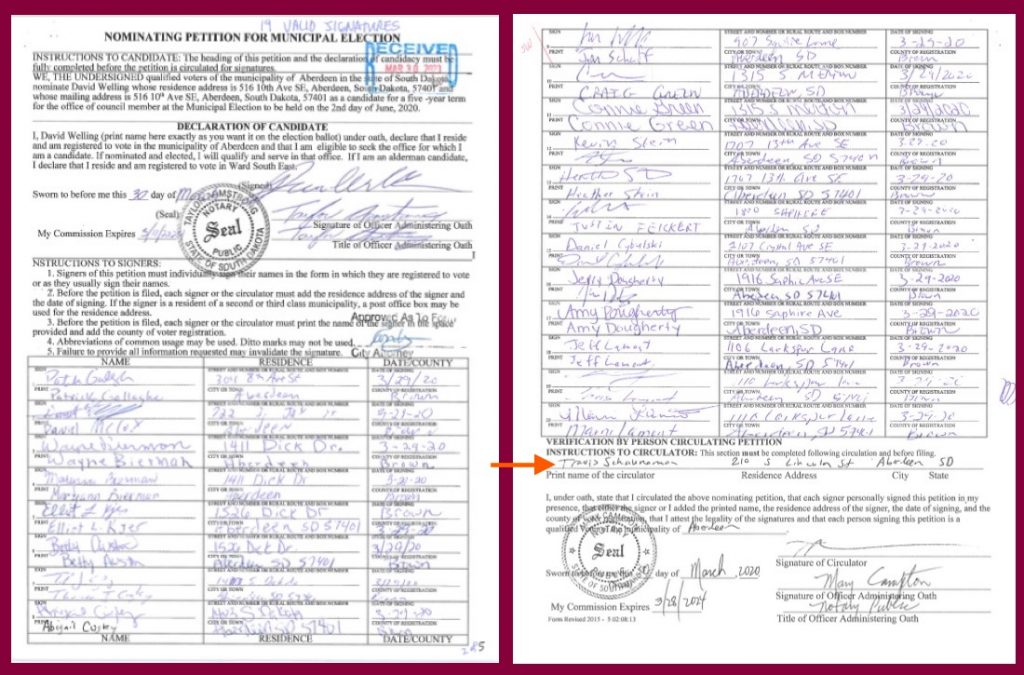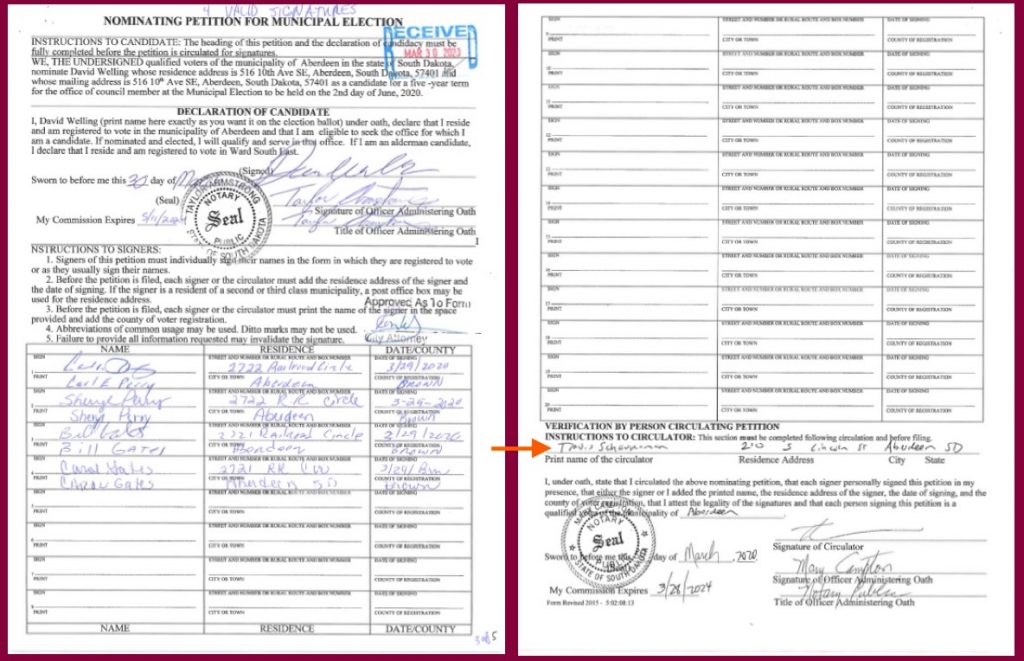Aberdeen Mayor Travis Schaunaman has violated the city’s conflicts of interest policy again.
Evidently unhappy with seeing his self-dealing and other bad ideas shot down by the large majority of practical, sensible, and nonideological city councilmen, Schaunaman went out and petitioned for local brewer David Welling to replace Dennis “Mike” Olson in a southeast council seat. Councilman Olson sternly criticized Mayor Schaunaman’s conflict of interest in bidding for the city’s rebranding campaign.
In the midst of coronavirus social distancing, Mayor Schaunaman collected signatures from 24 people on two petition sheets on March 29:


23 of those signatures are valid; Jon Schaff’s signature was tossed because he lives in the southwest council district.
Schunaman’s petitioning violated Aberdeen City Charter Section 7.02(a)(5):
No city employee shall knowingly or willfully make, solicit or receive any contribution to the campaign funds of any political party or committee to be used in a city election or to campaign funds to be used in support for opposition to any candidate for election to city office or city ballot issue. Further, no city employee shall knowingly or willfully participate in any aspect of any political campaign on behalf of or opposition to any candidate for city office. This section shall not be construed to limit any person’s right to exercise rights as a citizen to express opinions or to cast a vote nor shall it be construed to prohibit any person from active participation in political campaigns at any other level of government [emphasis mine; Aberdeen City Charter Section 7.02(a)(5)].
Circulating a nominating petition is an aspect of a political campaign on behalf of a candidate for city office. This subsection allows city employees to express opinions and cast votes, but it does not allow this level of active involvement in a city council campaign.
Section 7.02(b) says the penalty for this violation is forfeiture of office and banishment from municipal positions for five years:
Any person convicted of a violation of this section shall be ineligible for a period of five years following such conviction to hold any city office or position and, if no [sic?] officer or employee of the city, shall immediately forfeit his or her office or position. The city council shall establish by ordinance such further penalties, as it may deem appropriate [Aberdeen City Charter Section 7.02(b)].
Home Rule Charter Section 2.06(b) also says any council member, including the mayor, forfeits his office by violating “any express prohibition of this charter.”
Mayor Schaunaman may be eager to replace Councilman Olson with someone more willing to vote Schaunaman’s way. But whatever the outcome of the election in June, Schaunaman has created the strong possibility that he won’t be in office to enjoy that councilperson’s support.
Like so many politicians, Schaunaman thinks he got a mandate from the voters. But just like Trump, Schaunaman was less hated than his opponent.
Schaunaman probably got votes because he ran on changing he cities landscape ordnance. He has never even tried this as far as I can remember. Just like Trump, Schaunaman is more concerned about his own businesses then for the average voter.
Schaunaman, just like Trump thinks he can do anything in office. Luckily Aberdeen has council people that are keeping him in check.
He likely doesn’t consider himself an “employee”, but rather “the boss”. Just judging by what I’ve read about the guy on here – it’s likely he hasn’t thought of himself as an “employee” for decades. Like Trump – his mind set is he “owns” and should control, any organization he participates in. So of course “employee” doesn’t apply to him.
Richard, would you consider a member of the council to be a city employee?
Aberdeen pays its mayor $15K a year. If you get a paycheck, you’re an employee.
Council members get paid $8,500 a year. They are employees, too. Mayor and council members alike are covered by the policy that Schaunaman violated by circulating a nominating petition for a city council candidate.
It sounds like Aberdonians would be much better off without Schaunaman trying to reign over them. He’s the king; the citizens are the serfs.
What a guy.
I whole-heartedly agree that anyone who receives a paycheck (salary, stipend, whatever) from the city is AN EMPLOYEE. My post was simply meant to explain the mindset of the mayor, wrongheaded as he may be – it is still his head.
A surge of interest in this article brought an anonymous commenter who tried to post that this article looks like a “hit piece” and that the comments are biased toward “liberalism.” I’m curious, nymous neighbors: how is reading the exact wording of the law and pointing out that a public official has violated that law a “hit piece”? How is it “liberalism” to want city officials to follow the law? I thought everyone, liberal and conservative alike, shared an interest in the rule of law.
I serve on the school board. I am not a employee of the school. Legislators are paid by the state government, they are not employees of the state. They nor I get state pensions, state health care, etc etc. You are reaching hard with this one. He’s an elected official, not a city employee. You’ll lose this challenge and rightfully so.
If you are correct in assuming that elected officials are also employees and thus not eligible to circulate petitions. Does that also mean they can not circulate petitions for themselves for re-election? That is where I would error on the side that elected officials are not considered employees. I like these discussions about muddy areas of law. Fun topic and interesting situation.
That’s a good legal question, Justin. Nothing else in the charter or ordinance appears to prevent a city employee from running for office, and council members have obviously circulated their own petitions for some time without any legal challenge.
However, Section 2.05 of the charter prohibits any council member from holding any other city office or employment during the term for which a member is elected.
Dang, James! It seems to defy the conventional understanding that when you take a paycheck, you are an employee. What’s the statute that supports your distinction?